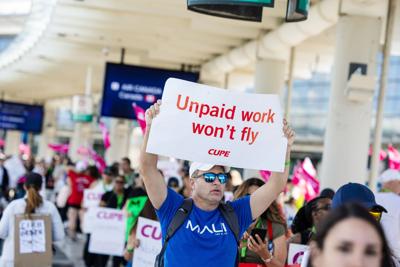The labour impasse over Air Canada flight attendants’ wages will move straight to arbitration as the union presses to bring closure to the dispute after workers almost unanimously rejected a tentative agreement.
The Canadian Union of Public Employees’ Air Canada component (CUPE) told the Star on Tuesday that after nine months of bargaining, it saw “no evidence” that the employer would offer a deal members could support during another three days of mediation.
“The union is therefore seeking an expedited process that will put money in our members’ pockets and conclude this process as quickly as possible,” said Hugh Pouliot, the spokesperson for CUPE.
On Sept. 7, 99 per cent of flight attendants voted down a proposed wage package that included total pay raises of 16 to 20 per cent, while other items — including improvements to pensions, benefits, and compensation for some ground work time — had been finalized at the bargaining table in late August.
Air Canada said in a news release that it has agreed to CUPE’s request to move the wage package to arbitration “in a spirit of cooperation.”
Steven Tufts, an associate professor of labour at York University, said the dispute ending up in arbitration was expected.
Next step would be arbitration if flight attendants say ‘No’ to deal as voting begins Wednesday.
“When there was such an outstanding rejection of where the wage rate was,” Tufts said, “that’s just a signal to the employer that they are pretty far off what the membership would find as acceptable.”Â
Air Canada considers 75 hours a month to be full-time work and, under the tentative agreement that was rejected, offered to pay a starting rate of $33.60 an hour. That amounts to $2,520 a month, which the union previously told the Star is still “less than the federal minimum wage.”
With the proposed pay scale, a mainline flight attendant would earn $48.15 an hour midway through their third year and $68.14 an hour by year 10.
Tufts said there’s debate in labour relations over how much an arbitrator might move on wages: some believe there will be little to no change, while others expect a modest bump based on industry practices at other airlines.
“But I think their consensus is that it’s very unlikely that there’ll be a radical increase in the wage rate,” Tufts said.
The tentative agreement likely sets the floor below which the arbitrator will not go, as the arbitrator must consider what will support a functional workplace relationship going forward, said Stephanie Ross, an associate professor of labour studies at McMaster University.
Air Canada pilots recently secured a 30 per cent wage hike over five years and 42 per cent over four years.
“While it’s not the case that flight attendants and pilots are directly comparable groups of workers,” Ross said “the gap is pretty significant, and that could be in the union’s favour.”Â
Both Tufts and Ross agreed that if employees are unsatisfied with the arbitration result, they may express their discontent in various forms of labour unrest.
Arbitration requires that both sides accept the outcome and prohibits a legal work stoppage, but there remains the possibility of some self-organized ‘wildcat’ strikes.
Federal jobs minister, Patty Hajdu, announced Monday the next step in its investigation into unpaid work in the airline industry will include two virtual roundtables with stakeholders in September and October.
“The allegations of unpaid work in the airline industry are deeply concerning,” Hajdu said. “We will get to the bottom of this.”Â
A key gain for Air Canada flight attendants in this round of bargaining is pay for some ground duty time, though it is not full pay — starting at 50 per cent of their hourly rate for the hour before takeoff and rising to 70 per cent by the fourth year of the contract.
Ross said the probe was announced in the middle of collective bargaining and could be the government’s way of buying time to resolve the labour dispute rather than making actual changes.
“Whether or not this process will produce change, I think, depends upon the union’s ability to continue to mobilize members and put pressure on politicians and on the Liberal government to actually make it happen.”































To join the conversation set a first and last name in your user profile.
Sign in or register for free to join the Conversation